It appears that over the last year or so there have been changes to the Google algorithm which alters the type of information that Google shows to you in the search results.
These new results seem to have a bias against alternative health care, especially against the non-conventional viewpoint on thyroid care and management.
Information that is supportive of advanced thyroid lab testing, extended thyroid medications, and natural therapies seems to have a much smaller reach than it used to.
In this article, I want to walk you through some of these specific examples, talk about the changes to the Google algorithm over the last year, and discuss how this impacts you as a thyroid patient.
Quick Basics of Google, Searching, and Why it Matters
I want to be clear about a few things before we even start.
#1. I’m not making any accusations about the state of Google and what it is or isn’t doing.
I’m simply providing information, which is available to all of you as well, and putting it together.
My own personal belief is that it suggests that something is going on, but I’m not entirely convinced that the results we are seeing are necessarily intended.
#2. I’m not complaining.
My website has certainly been hit by these changes but I don’t want this to come off as complaining.
Instead, I’m using my own personal information and experience to help provide more insight into an issue you might not even be aware of.
And lastly, if you want to jump down to the end, you can see specific examples of how Google searches have changed dramatically over the last 11 months or so.
Before you jump down there, though, I would recommend that you read some of this more basic information about Google and how it works just so you have a better understanding of what is happening and how it impacts you.
Back on topic the main topic for just a few minutes:
What is Google and what is it supposed to do?
Google, as a search engine, is designed to provide you (the user) with the results which are most meaningful to you.
It’s really just an organizer of the billion bits of information that are available to you.
Its primary job is to give you the results or answers to the problem that YOU are searching for.
They do this by trying to predict what things you are searching for and what
And this is actually easier said than done.
Consider this example for a minute:
Let’s say you are someone searching for the term “reverse T3” (we are using this example because you will see that the results for this exact query have changed dramatically).
When you, as a patient, make that search you are probably looking for more information about what it means, what ranges are normal, how to treat it if it’s elevated, and so on.
There are other people searching for that term as well (perhaps doctors or medical students) who are looking for different information.
Google’s job is to provide each of you with the information that you are looking for whether that be more educational or more clinical and actionable.
It used to be that Google would provide back information based on this intent and it would push up information that most people agreed was the best information for that topic.
They did this by monitoring how long you stayed on a certain page, how likely you were to share it, and other signals from you as the user.
It used to be this way until about 1 year ago when Google started to promote certain ideas and concepts despite the fact that this isn’t necessarily what most people want to see.
The more conventional viewpoints are being endorsed by Google while the less conventional (alternative) viewpoints are not.
And this is what I mean by Google is suppressing alternative health information.
If it turns out to be true that Google is either intentionally or unintentionally (through algorithm adjustments) suppressing this type of information then that is a big deal.
It would suggest that Google is trying to provide you with the information designed to create a certain narrative.
So instead of you searching for reverse T3 because you believe that it might help you, Google is trying to suggest to you that this test is wholly irrelevant and completely unnecessary.
Who wins in this situation?
As someone who believes that reverse T3 can add tremendous value to existing thyroid lab tests, I strongly believe that YOU as the patient are the one who suffers because of this change.

Furthermore, this sort of suppression can seriously stifle innovation and advancement of new therapies.
As a patient, don’t you want to encourage doctors to discuss (ad nauseam) the therapies that impact YOUR life?
Don’t you want to know that they have discussed every minor facet or detail of every thyroid medication available on the market?
Wouldn’t it be better to hear both sides argue for their point which would then advance the knowledge on both sides?
This sort of suppression encourages groupthink and the perpetuation of dogma (1).
Instead of allowing someone to challenge an idea, with the way that Google currently operates, that information is shut down or suppressed and made incredibly difficult to find.
This philosophy is concerning for the following reasons:
#1. All new therapies and treatments are controversial at their inception!
Consider the case of the discovery that h. pylori infection causes stomach ulcers and not stress (which was the predominant theory at the time).
The doctors who proposed this theory were literally laughed off of the stage when they presented this information.
It took around twenty years (from 1982 until 2005 when they were given the Nobel Prize for Physiology or Medicine) for doctors to catch up to them.
“Until that time, so entrenched was the belief that lifestyle caused ulcers that, even with their evidence, it was difficult for these two researchers to convince the world of H. pylori’s role in ulcer disease. In fact, Alfred Nobel himself said in the late 19th century, “Worry is the stomach’s worst poison.” To provide even more conclusive evidence, in 1985 Marshall deliberately infected himself with the bacterium and established his own stomach illness.”
– Nobel Price for H. pylori discovery (2)
This information would have certainly been suppressed in our day even if it was correct because it is outside of the conventional dogma (our current understanding of how certain diseases work).
It may very well be (and I strongly believe this) that in 20 years we will look back on thyroid management and find out that we did it wrong for decades.
Something like Google can actually accelerate the advancement of information so long as it doesn’t choose which information to suppress (or not).
Let people and researchers contend and argue over the information and let the theories naturally rise to the top.
I don’t want to irradiate my own thyroid and treat myself with thyroid medication just to prove a point.
#2. It takes doctors 17 years, on average, to come to terms with new science and literature.
Do you, as the patient, really want to wait 17 years for your doctor to understand and practice the information that you are reading on blogs or websites?
We can consider a real-world example of the ketogenic diet.
This diet has been available for a long time, I remember learning about it for the first time around 2010, but it wasn’t made popular until around 2017 (according to Google trends):
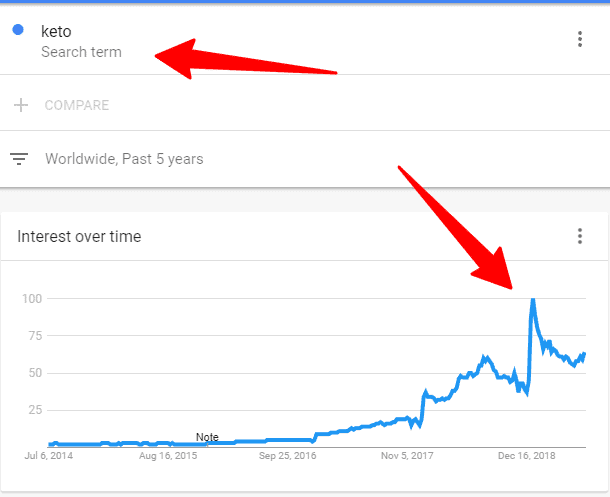
If you were to ask your doctor about keto around that timeframe you would have definitely received a negative response.
The reason it became so popular was because of patients sharing their stories, certain doctors discussing the benefits on youtube, and other people gaining access to this information.
Services like Google can accelerate the availability of information and reduce the 17-year gap between science and its application in clinical practice (3) if it’s used correctly.
If Google is suppressing some information in the name of safety they may be inadvertently slowing down innovation in the process.
Examples of how search engine results have changed
With this backdrop, let’s now consider some real-world examples.
The following are all examples of changes to the search engine results page (SERPs) from my own searches which highlight what I’ve been discussing thus far.
You are definitely able to re-create these issues on your end, and I would definitely encourage this, but please understand that your results might be slightly different than what you see here.
This has to do with a number of factors including the fact that Google often runs tests on the results pages to see what people like the best.
You shouldn’t, however, see any major changes from what I have input below.
Another important point is that when I refer to changes in search traffic I am referring to what is known as organic listings.
Organic listings refer to how Google ranks individual websites but these results often appear UNDER the advertisements.
Google, of course, wants to show you its own advertisements first, because that’s how they get paid, and these ads are not included in the rankings that you will see below.
Lastly, you will also notice that when you do these searches you might see some advertisements.
You won’t see any in my screenshots below because I have them blocked for this demonstration.
I’m more interested in organic listings compared to advertisements because this information is more important.
Studies have shown, for instance, that most of you who use Google simply ignore the ads anyway and go straight to the organic results (much to the chagrin of Google!).
#1. The search term “reverse T3”
First on the list of examples is something called reverse T3.
I won’t go into detail about what reverse T3 is other than saying that conventional medicine (your primary care doctor and endocrinologist) do not think that it has any clinical utility or benefit.
This is in contrast to the alternative viewpoint (and the viewpoint that I take) which states that reverse T3 can be useful as a tool to help guide the management of thyroid medications and to help determine how well you are converting T4 into T3.
Whatever side you take isn’t important here, but what is important is how the search results have changed over the last year.
One year ago, if you searched for the term “reverse T3” you would see articles that discussed how this lab test could be beneficial, how to calculate things such as the free T3: reverse T3 ratio, what causes a high reverse T3 level, and so on.
The reason these results came up on top is that the people that were searching for that term were looking for THAT information.
Let’s fast forward to today (July 1st, 2019) and take a look at what Google currently shows:
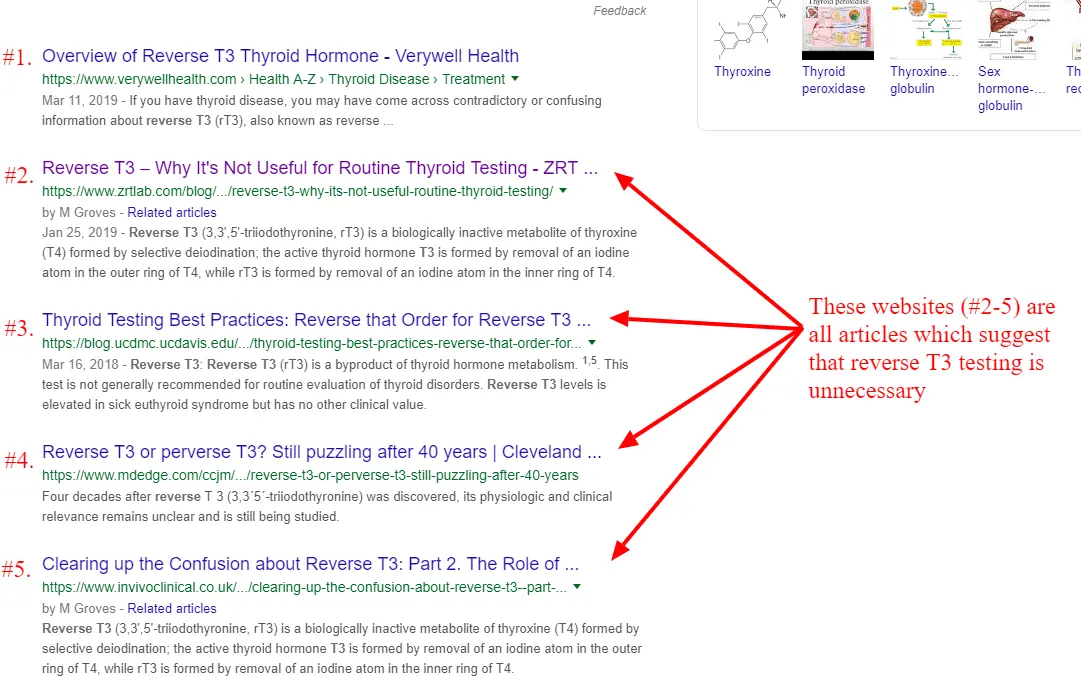
The list above represents the top 5 organic search results when the term “reverse T3” is put into Google.
What you see is that out of these top 5 results, 4 of the results take a negative tone about reverse T3.
In fact, the titles of these articles mostly center around why this lab test is unnecessary and why you don’t need it.
This isn’t a problem by itself until you consider a couple of other factors.
You might say to yourself, “maybe people actually want to see the information about why reverse T3 is not helpful” and you might be right.
But further analysis shows something different.
If you type in the result “reverse T3” and then scroll down to the bottom of the page you will see something that says “Searches related to reverse T3”.
This list of terms is another term that people who search for reverse T3 are also interested in.
This is based on hundreds of thousands (or millions in some cases) of results and data from users (people) just like you.
Look at what other people are also searching for:
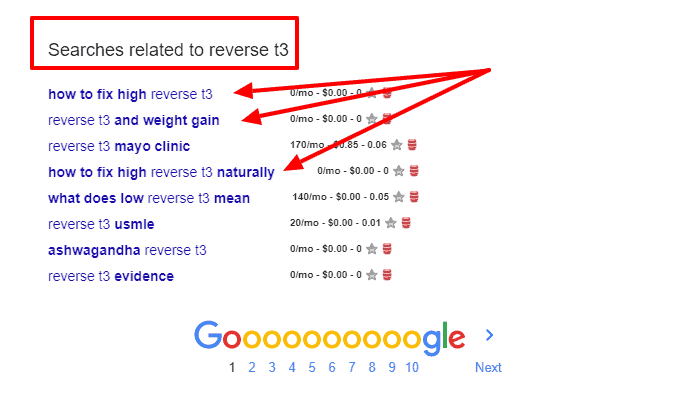
People who are searching for reverse T3 also want to know how to fix high levels, if reverse T3 is associated with weight gain, natural approaches to treating it, and so on.
The only “medical” inquiry related to reverse T3 is “reverse T3 usmle” which probably means nothing to most of you, but that’s a search term by medical students who are studying for their second-year medical exam!
This suggests that MOST people who are searching for reverse T3 already know, at least somewhat, what the test is and are looking to find more information about treatment.
They are NOT necessarily interested in the articles that the Google algorithm produces which are related to why the test is not helpful.
I know this because prior to August 2018, I also ranked very highly for this keyword.
The page that used to be high on that list had over 4,000 social shares and over 450 comments.
The currently #1 ranked website has 43 shares and 5 comments.
The fact that my page has more shares, a higher word count, and more comments don’t necessarily make it a better article (I’m not making that argument).
But it draws attention to the idea that perhaps the results are being skewed to show a certain type of result rather than the result that most people actually want to see.
This may make sense if you are trying to prevent someone from “hurting” themselves but I think we can agree that testing for reverse T3 does not result in any harm.
On a side note, you can still find the old “top” results but they appear on pages #2 and #3 of the search results and not page #1.
#2. The search term “How to cure hypothyroidism permanently”
If you search into Google “how to cure hypothyroidism permanently” you will get something like this:
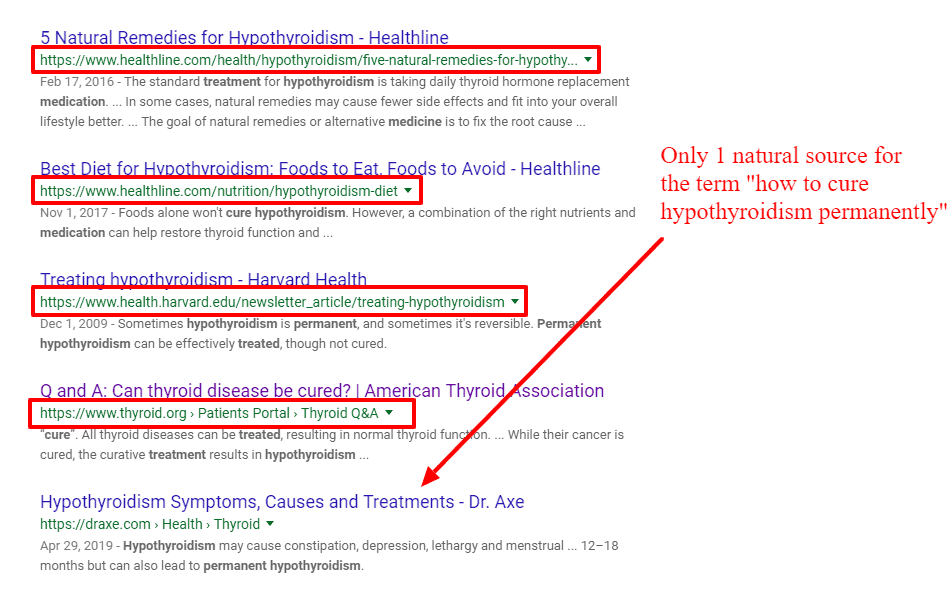
You would expect that for such a specific question about managing any medical condition Google would spit out results from companies that focus on that thing.
You might expect results from Dr. Axe, Mercola, my website, or other websites which suggest that treating hypothyroidism naturally is actually possible.
Instead, you get 4 out of 5 results from “conventional” resources such as healthline.com, harvard.edu, and thyroid.org (you are probably starting to see a trend here).
These aren’t necessarily bad resources, I’m not making that claim, but I am suggesting that you probably won’t get the “best” information about how to treat a medical condition from someplace like Harvard.
Instead, you would expect Harvard to talk about the latest research, how prescription medications help treat the thyroid, and so on.
You would expect information from Dr. Axe to include therapies such as essential oils, exercise routines, foods to eat (and avoid), and so on.
Again, the information provided by google seems like a mismatch between what the user (you) is looking for and what they are providing.
#3. The search term “thyroid supplements”
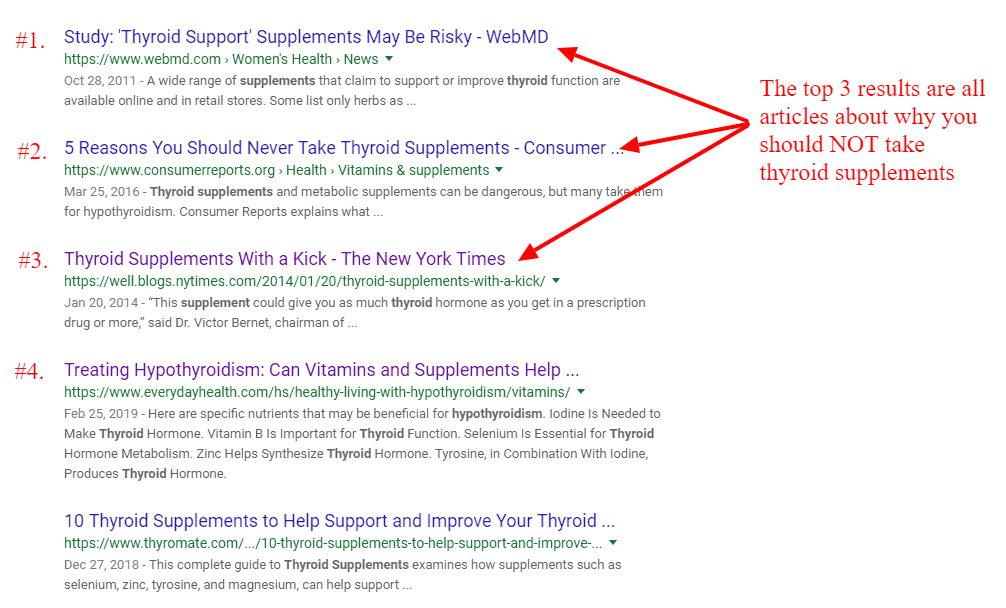
There are a couple of REALLY interesting things to point out with this query.
The first is that when you search for the term “thyroid supplements” on Google you will be given back articles that are all centered around why thyroid supplements are not safe and even harmful to your body.
This is interesting because it suggests 1 of 2 things.
Either Google is making the assertion that people searching for this term actually meant to search for “are thyroid supplements harmful” or that they are taking a stance and trying to suggest that thyroid supplements ARE harmful.
The second, perhaps more interesting, is that the advertisements for this query are all related to actual thyroid supplements:
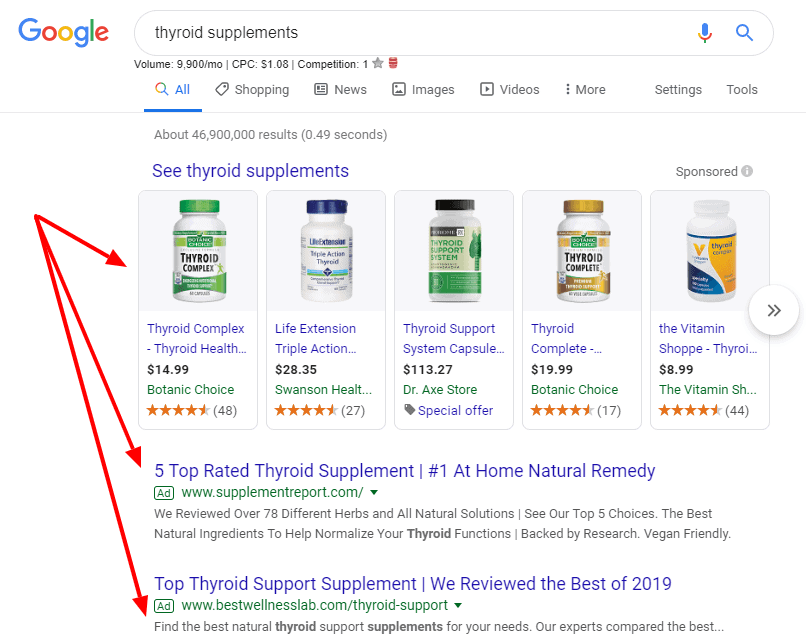
This is worth mentioning because it tells you something very important.
The people who are searching for thyroid supplements have the intent to purchase these supplements, presumably because they know that they will work.
How do we know this?
Because Google already has a fairly good idea behind the intent of certain keywords and companies bid to put their ads on those keywords.
So if supplement companies are putting ads on the keyword “thyroid supplements” you know it’s because people are interested in purchasing supplements when they search for that term!
There is no mismatch between user intent (what you want to find) and what you are actually getting.
Instead, you see that Google is trying to feed you information that suggests that thyroid supplements are harmful (look at the first three results) but at the same time other companies are trying to advertise their own products on that same query.
There is a mismatch between these two things.
I can also tell you from my own personal experience that most people who are searching for this term are genuinely interested in learning more about how supplements can potentially help their thyroid.
I know because prior to August of 2018 my own article ranked very high on that keyword and it was specifically about how certain supplements can help your thyroid.
For the record, that particular article has over 36,000 total shares and over 100 comments.
The current article from WebMD that ranks #1 for the keyword has 17 total shares and is from 2011.
I know that shares aren’t an indicator that the article is good, but this suggests to me that something has changed over the last year or so and not necessarily for the better.
It also seems more plausible to me that if people were actually interested in learning whether or not the supplements were harmful, they would probably search for something like “are thyroid supplements dangerous?”.
And, what’s interesting, is if you search for that term you get nearly the exact same results as the first query:
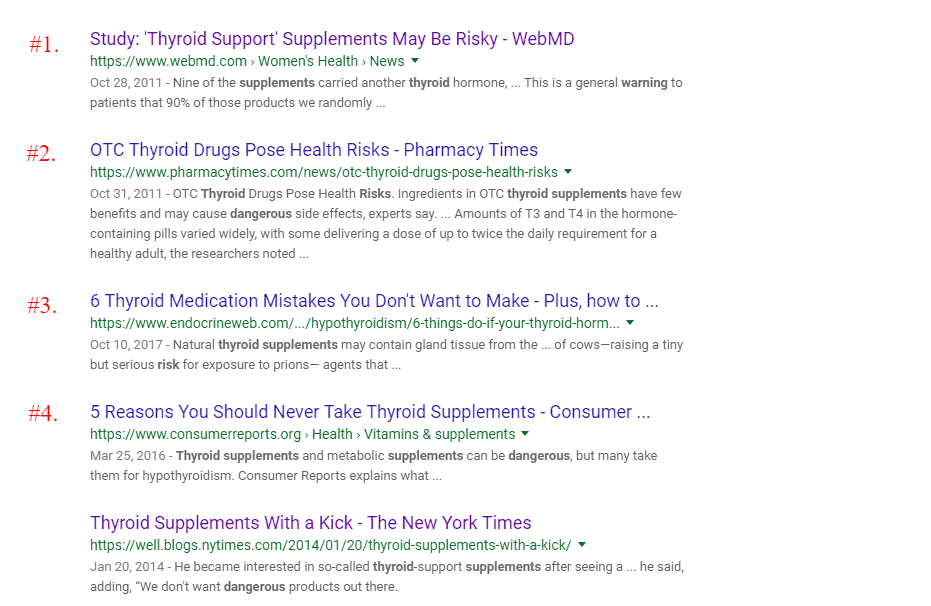
This is where it seems Google is injecting its own opinion into the search results.
#4. The search term “adrenal fatigue”
This one is 100% related to the thyroid but I wanted to include it here to show you that these changes have extended beyond just alternative treatment of the thyroid.
This example has to do with a condition known as adrenal fatigue.
Adrenal fatigue is NOT recognized as a real condition by the conventional medical community. If you told your “endocrinologist” that you had adrenal fatigue he would probably give you a funny look and insist that the condition isn’t real.
Alternative providers, on the other hand, do believe that it is a real condition that results in very specific symptoms due to dysregulation of cortisol and cortisol receptor sensitivity.
My personal stance is that this condition is certainly real but that we still have a lot to learn about it, about how to test for cortisol, and about how to treat it correctly.
But let’s leave aside for a minute about what I think and focus on how Google views this condition.
If you search “adrenal fatigue” into Google you will see something similar to this:
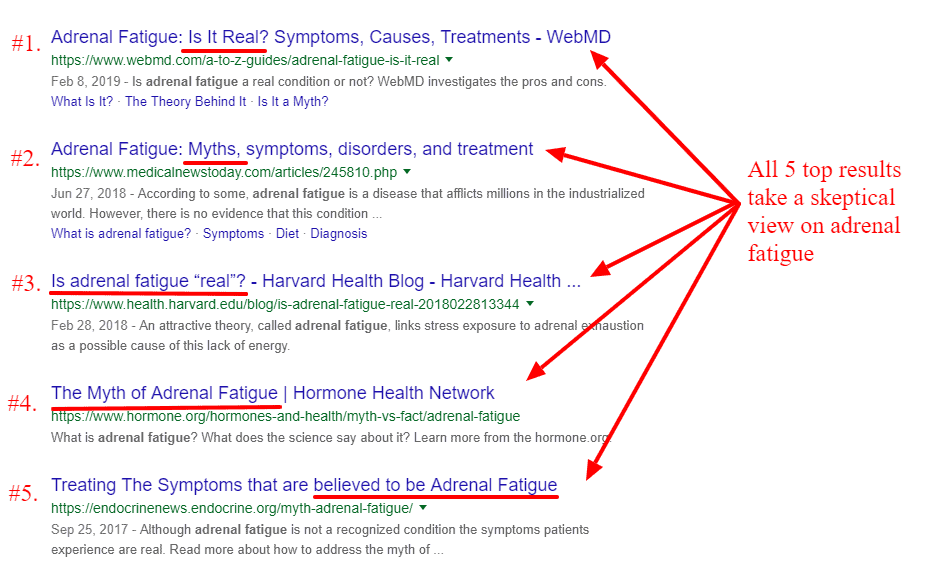
The top #1-5 results are all from conventional medical sources (webmd.com, medicalnewstoday.com, harvard.edu, hormone.org, and endocrine.org).
This isn’t a problem, but you can tell from the title of their articles that they take a very critical or skeptical view of the condition often referring to it as a “myth”.
You could, again, make the argument that people are interested in what these websites have to say on the matter but further analysis suggests otherwise.
If we go down to the bottom of the page we see the “searches related to adrenal fatigue” from Google which shows the following:
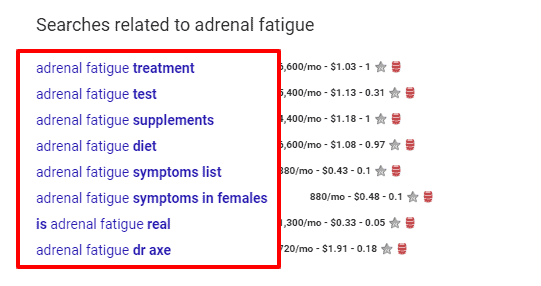
On this list, you see information such as “adrenal fatigue treatment”, “adrenal fatigue test”, “adrenal fatigue supplements”, “adrenal fatigue diet”, and so on.
These do NOT look like the searches of someone who doesn’t believe that adrenal fatigue is real.
The only one that would fit the list is #7 on the list which is “is adrenal fatigue real”.
The related searches suggest that Google is providing a specific critical set of information about adrenal fatigue even though the intent of the user (you) is that you already suspect that it is a real disease and simply want more information on how to treat it.
Google algorithm updates that have suppressed alternative health sites:
The way Google does what it does is through something known as the Google core algorithm.
This is really just a term used to describe some incredibly technical algorithm that takes all of the factors we have mentioned before and takes all of the information on the internet and spits out organized information back at you when you use Google search.
You may have never heard about this algorithm before because it probably wouldn’t affect you unless you have a website.
But there are careers dedicated to the study of this single topic, so it’s actually quite large and important.
Every so often Google will make big changes to this algorithm (they are constantly making small changes to it) which results in dramatic overnight changes to what you see when you search for terms.
Over the last 11 months or so there have been two major updates to this algorithm which have resulted in negative changes to health websites.
Just for a quick overview, I’m including them below:
#1. August 2018 “Medic Update”
- The Google Medic Update (called the medic update because it primarily impacted health websites) caused massive drops in organic traffic to websites such as draxe.com and mercola.com by as much as 80%.
This update was supposed to improve search results by promoting websites that have “authority” in the health space.
The result was that certain websites (verywellhealth.com, healthline.com, webmd.com, and medicalnewstoday.com) come up on top for all search results.
This isn’t a problem, but these websites all have a very conventional spin which limits your access to varying viewpoints.
#2. June 3rd, 2019 Google Core Algorithm update
- This was another large algorithm update that again dropped alternative websites such as mercola.com and draxe.com by a significant amount (30-50%).
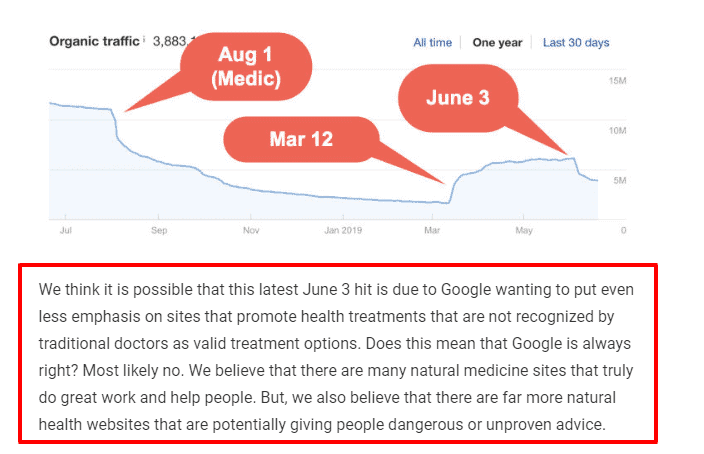
*Note: there are lots of little changes but these were the biggest two.
Google is not open about why they make changes but most people agree that these changes were made to try and provide the user (you) with results from more “authoritative” searches.
It seems as well that they are also trying to protect you (the user) from doing something bad with your health if you were to read bad advice.
This sounds great in theory, but the outcome has been that certain websites dominate the results while others are getting pushed down.
It seems further tweaking has also resulted in more subtle changes to the algorithm.
These more subtle changes have pushed down information that is not considered to be “mainstream” or “conventional”.
This would include a variety of topics such as adrenal fatigue, thyroid management with T3 medications, advanced thyroid testing, vaccines, non-GMO, the use of organic foods, the use of certain diets (ketogenic diet comes to mind), etc.
When you search for something related to these topics you are now given results from Google which often contain information that is critical or negative about these topics whereas previously you would find information that was more receptive.
Remember:
Google’s job (and purpose) is to provide you the user with the information that YOU want to see.
If they are no longer doing this, if they are pushing the information that THEY think is correct, then you as the user should be made aware of it.
I have provided many examples of this very phenomenon above.
Further suspicious action from Pinterest & Facebook
There have been other instances recently where certain social media platforms have also banned certain alternative health-oriented communities.
I’m not suggesting that these are tied to Google in any way, but I do want to include them here just as a friendly for-your-information.
It’s relevant to us in the thyroid community because I know that many of you are a part of certain thyroid groups on Facebook.
If Facebook decides to ban these groups then that would disrupt our ability to communicate and share information with each other.
The instances I am referring to can be found below:
#1. The banning of greenmedinfo and Natural Health from Pinterest.
#2. Facebook has deleted natural health-oriented Facebook groups.
Facebook has stated that the natural health groups were banned due to spam and Pinterest has claimed that greenmedinfo was banned due to spreading false information regarding vaccines.
I haven’t looked into each case so I can’t comment on the content of what they were posting.
Whether you agree with the information posted by these groups and websites is largely irrelevant.
The issue is that you should still have access to the information if you desire to take a look at it.
And this holds true of the information on my website as well.
Even if you disagree with my points on thyroid management and how I approach thyroid disease I still want you to be able to read it and come to your own conclusion.
Even if my ideas and theories have flaws (which I’m sure they do), you are bound to find some information that is still helpful and which can help you on your journey to feeling 100%.
When you put this information together with the results in Google the situation becomes even more suspicious.
What can you do?
Even though it may seem frustrating to see these recent changes, there are things that you can do.
#1. Use another search engine besides google.
Believe it or not, there are alternatives to Google and these alternatives do not store nearly as much personal information as Google does.
The only downside to these alternatives is that most of them get their data from Google itself so by using them you probably won’t get dramatically different results.
But, even if you don’t get different results, you are still sending a message to Google by not using their platform.
If they see enough people avoiding their search engine or using something different then it may push them to change.
Alternatives to Google include:
- StartPage – Provides you with Google search results but without the tracking.
- DuckDuckGo – A private search engine based in the United States.
- Ecosia – Search engine based in Germany which donates part of its revenue to planting trees.
You can find a complete list of Google alternatives here (including Gmail, Google docs, and so on) if you are concerned about privacy.
#2. Look beyond pages #1 and #2 for the results that you want.
I don’t know if you remember Google back in 2009 but it was a mess.
This was around the time I was in Medical School and I remember sometimes searching deep into pages number 55 and 56 just to find whatever it is that I was looking for.
The information was out there but Google just wasn’t good enough (at that time) to give it to me.
Fast forward to most of 2018 and Google was actually fairly good at giving me the information I was looking for.
Now that we are in 2019, I feel that we have taken several steps back.
I still search for information to expand what I think I know about unconventional topics in medicine and I am finding it harder and harder to get that information.
I am now having to search through pages 4 or 5 of Google to find it.
It’s still there but it’s buried behind information that I just don’t think is useful.
I’m just not interested in looking at what the mayo clinic has to say on the use of T3-only thyroid medication because I already know what they will say.
I’d rather get real information from other websites or even real patient examples, so I can compare what I know to what people are actually experiencing.
Unfortunately, we may now be in a situation where you (as the user) need to search through pages and pages again to find the content you are actually looking for.
This behavior (from you) may also suggest to Google that you aren’t finding what you are looking for and that they need to change their algorithm.
#3. Type in longer keywords and phrases which are closer to what you are looking for.
Another strategy you can employ is typing in longer keywords or phrases into google.
For instance:
If you want to look for an article on reverse T3, type in something such as “reverse T3 natural treatment” instead of just “reverse T3”.
This should help eliminate the websites which are trying to suggest that reverse T3 is useless and, instead, bring up websites that provide useful information to YOU.
This also applies to other queries such as “adrenal fatigue natural treatments” and so on.
#4. Share this article!
In a world where this type of information is becoming increasingly difficult to find, you need to make sure that you keep track of the information you like!
The best way to do this is by sharing the information, such as this article, that you are passionate about.
This includes sharing on both Facebook and Pinterest (at least for now).
Sharing allows you to save the information to your social media feed and it also brings awareness to the issue.
In addition, I would also suggest that you bookmark your favorite websites and visit them on occasion.
If the suppression of natural health continues then it’s going to be more important for you to do your part in staying up on it.
#5. Sign up for email lists of the people that you really like.
Most major websites have email lists that you can sign up for.
If you go to a website and you really enjoy the content (or the message), then be sure to sign up for their email list.
This will allow them to stay in touch with you outside of the influence of both social media and google.
If you like this information, you can sign up for my email list on this page.
Conclusion
I want to be clear that I’m not suggesting that Google is actively trying to suppress alternative thyroid information.
I have no idea whether that is their true intent or not.
My suspicion is that they have probably made changes to their algorithm which prefers the safety of the user but which has also simultaneously suppressed information from the alternative health space.
But, regardless of the reason, the changes are impacting the information that you get from google.
It also seems, at least currently, that if you are looking for an alternative view on medical conditions, Google may not be the best source of this type of information.
Now I want to hear from you:
Have you noticed any changes to the information you get from google?
Has it impacted you in any way?
Do you know of anyone else who has also come to this conclusion?
Do you completely disagree with my assertion here? I would especially love to hear from you if you think all of this is completely wrong.
If you have any other information that you’d like to share (or examples from Google searches) please do! The best way to get this information out is to share it in the comments or share it on other social media platforms.
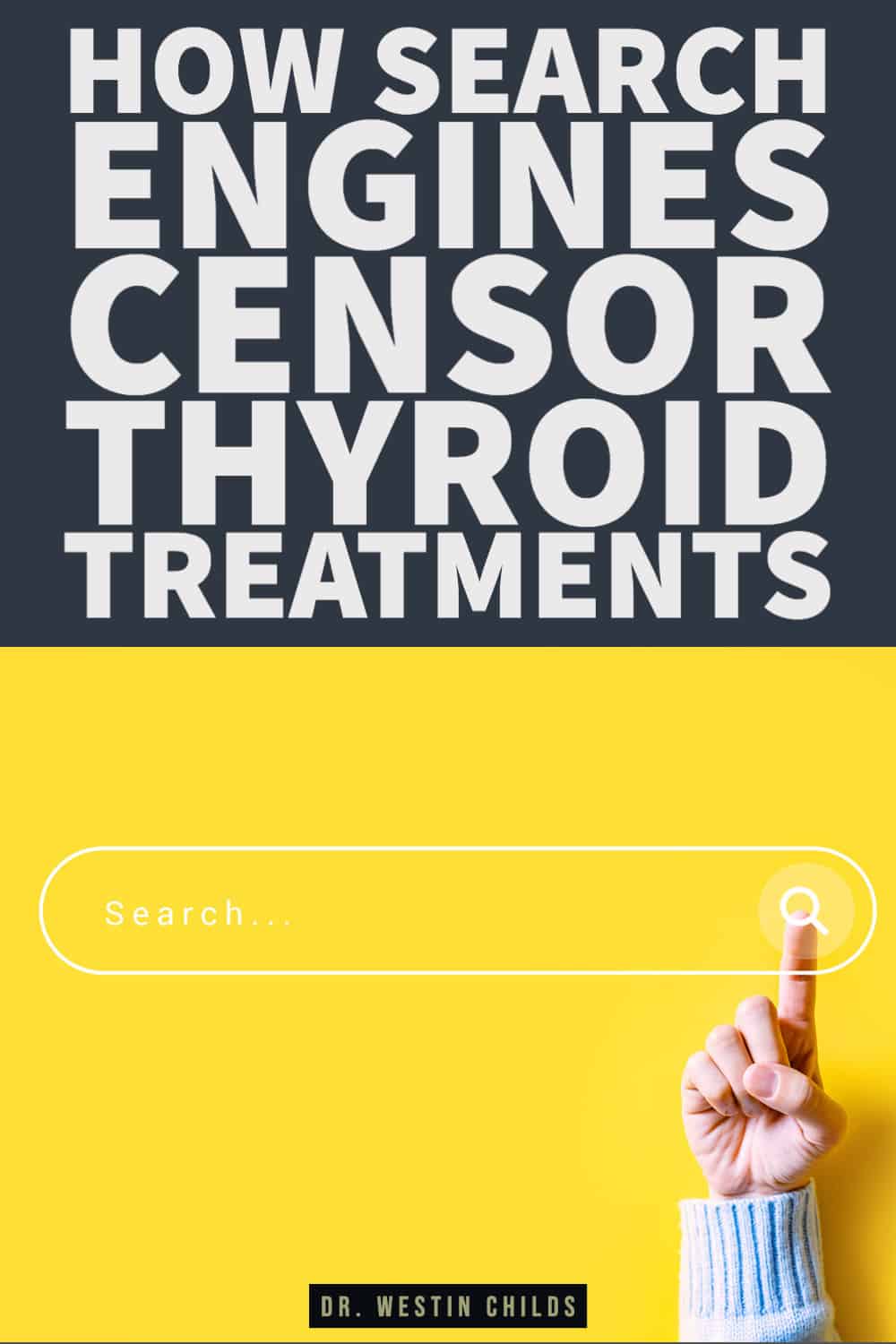




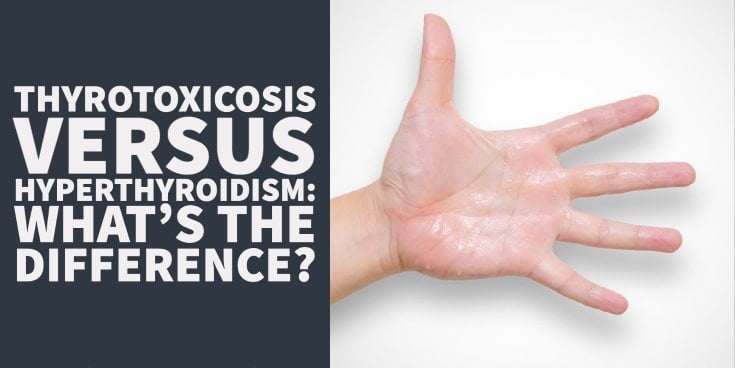



It took me forever to find this site, and I suspect content on Dr. Westin’s blog is on target. I also used duckduckgo and it still took some “digging” through many pages to find relevant information. This is censorship plain and simple and reeks of a big brother mentality. My opinion of course.
I personally believe that social media companies are receiving pressure due to anti-vaccination information and the current state of measles resurgence. Perhaps the change in search engines is the result?
Hi Scuba lady,
I think it’s a lot of things including pressure from other groups (as you suggested) but also I think there is a desire to control the flow of information. I would tend to believe that Google is doing this for the greater good (as in they are trying to prevent harm) but they are happy to accept money for ads that place even shady content at the top of the search results, so I’m not convinced that this is the case either.
I don’t think the public will stand for it forever, though, as censorship has a way of backfiring ultimately.
This article is a bit old, but I wanted to say, heck yes. Thanks for talking about this!!! I think the flow of info is biased. For sure. Politics and money and other pressures are real even for big companies like Google. Especially for them.
I stopped using Google in 2019 because of this. Have you tried to enter your name into Google, doctor? One of Google’s suggested searches is “Westin Childs quack.” No joke. Though, none of the results that pop up suggest you might be one!!!
Hi Maureen,
Hope you found it helpful! And I’ve noticed that about my name as well, haha, it’s a crazy world we live in!